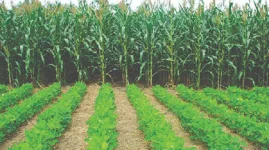Zimbabwe Farmers Hit Full Planting Target as Rains Continue.
Zimbabwean farmers have planted 3.87 million hectares of crops this season, reaching their target. The success comes amid steady rainfall across the country.
Maize leads with 1.8 million hectares planted, followed by sorghum at 418,000 hectares and pearl millet at 275,000 hectares. Farmers continue to add sweet potatoes and sunflowers to their fields.
"The crops look good across all provinces," said Leonard Munamati, chief director of Agricultural and Rural Development Advisory Services. He noted that 65% of the maize planted last December had reached late growth stages. Early-planted maize makes up 15% and moves toward flowering.
Recent heavy rains have created challenges. Some fields show signs of nitrogen loss and water buildup. Munamati urged farmers to dig channels for proper drainage.
The season's timing limits new plantings of cereals, soybeans, and groundnuts. Farmers can still plant quick-growing sugar beans, African peas, and sweet potatoes.
Munamati stressed the need for careful fertilizer use. He advised splitting fertilizer applications to keep nutrients in the soil. Weed control remains crucial for crop success.
Pest management needs attention, especially for Fall armyworms and African armyworms. "Check fields often and treat problems fast," Munamati said. "Keep watching for signs of return after treatment."
The farming season has brought both progress and challenges. Success depends on how farmers handle these issues in their efforts to achieve strong harvests.
Zimbabwean farmers have planted 3.87 million hectares of crops this season, reaching their target. The success comes amid steady rainfall across the country.
Maize leads with 1.8 million hectares planted, followed by sorghum at 418,000 hectares and pearl millet at 275,000 hectares. Farmers continue to add sweet potatoes and sunflowers to their fields.
"The crops look good across all provinces," said Leonard Munamati, chief director of Agricultural and Rural Development Advisory Services. He noted that 65% of the maize planted last December had reached late growth stages. Early-planted maize makes up 15% and moves toward flowering.
Recent heavy rains have created challenges. Some fields show signs of nitrogen loss and water buildup. Munamati urged farmers to dig channels for proper drainage.
The season's timing limits new plantings of cereals, soybeans, and groundnuts. Farmers can still plant quick-growing sugar beans, African peas, and sweet potatoes.
Munamati stressed the need for careful fertilizer use. He advised splitting fertilizer applications to keep nutrients in the soil. Weed control remains crucial for crop success.
Pest management needs attention, especially for Fall armyworms and African armyworms. "Check fields often and treat problems fast," Munamati said. "Keep watching for signs of return after treatment."
The farming season has brought both progress and challenges. Success depends on how farmers handle these issues in their efforts to achieve strong harvests.












